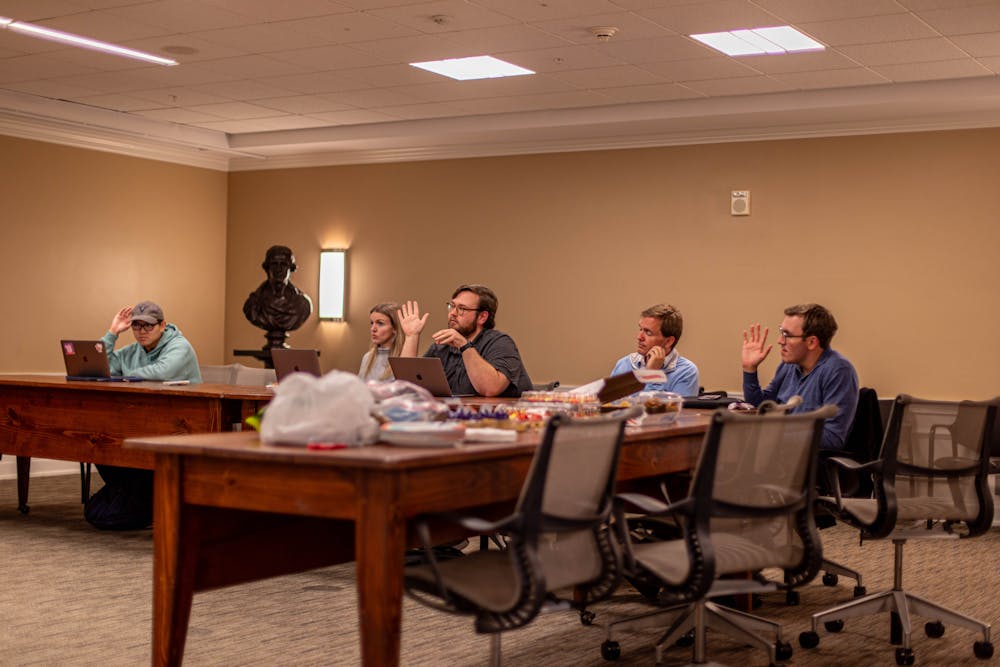The Honor Committee voted to strike the community engagement sanction from their bylaws and to consider ways to address the overrepresentation of international students in Honor cases at their meeting Sunday. The meeting met quorum with 23 out of 29 members present, meaning the Committee could vote on matters regarding the constitution and bylaws.
At their last meeting, the Committee considered the removal of the community engagement sanction — a sanction that would allow students to make amends for an Honor offense through community engagement — but made no formal vote.
Currently sanctions include but are not limited to expulsion, suspension, education, and amends. Specific sanctions are designated under these categories, and the community engagement sanction was previously categorized as an education sanction.
Prior to the motion to completely remove the sanction from the bylaws, second-year Engineering Rep. Alexander Church motioned to categorize the community engagement sanction as an amends sanction rather than an education sanction. Education sanctions are intended to allow students to rediscover their role in the Community of Trust, while the amends category allows for students to leave a positive impact in place of the harm they caused, according to the Committee’s website.
“I believe the primary function that we're intending community engagement to look like is as amends,” Church said. “[The Policy and Procedures memo] included examples that I felt were clear examples of amends.”
Law Rep. Daniel Elliott disagreed with Church’s suggestion, and instead suggested a complete removal of the community engagement sanction from the bylaws. The sanctions included in the bylaws are non-exhaustive, Elliott said, and that the Committee could choose to sanction students beyond what is mentioned in the bylaws.
Ultimately, the Committee voted to completely remove the community engagement sanction from its bylaws, with 14 members voting in favor of a motion to strike the reference to “community engagement” in the section of the bylaws that provide examples of sanctions that fall under the education category.
The Committee also discussed the overrepresentation of international students in Honor reports, which has long been a point of concern for the Committee. As detailed in the 2019 Honor Bicentennial Report — released by the Honor Committee to explore the data, history and stories behind the Honor system — international students made up 10 percent of the student population, but 28 percent of Honor reports from 2012 to 2017. There is no documented data following this period.
During the meeting, committee members considered proactive measures to mitigate this discrepancy, such as tailored education and outreach initiatives catered to international students and potential policies and guidelines.
Second-year Darden Rep. David Armstrong spoke about student engagement and educational programs put on by Darden that have had an impact on international students at Darden.
“I think [engagement and education] have been helpful, and also making sure that we take the time to tailor the information that we are disseminating to international students and understand what that looks like and what that means,” Armstrong said.
The Honor Bicentennial Report also outlined a number of solutions to the overrepresentation of international students, such as outreach partnerships with international student Contracted Independent Organizations and an international student town hall that would discuss how international students perceive Honor.
Graduate Engineering Rep. Kasra Lekan thought that more education initiatives for international students on the Honor system would be valuable, but also presented possible obstacles such as a lack of attendance. Lekan suggested that the Committee focus its efforts on setting professors up to have conversations with international students about Honor.
“The relationship in the classroom with the professor is where I think the vast majority of students have their primary and only interactions with the Honor system,” Lekan said. “That is the place where we have the most impact on educating professors on how to better engage their international students.”
The Committee made no formal vote on the topic, but the topic will be discussed further at the next Committee meeting.
Following this, the Committee discussed the identification of possible mentors for the mentorship sanction. If given this sanction, the student would meet three to four times a semester to discuss their offense with a faculty member to help them to re-enter the Community of Trust. Professors who choose to mentor would have a rehabilitative role.
Law Rep. MK O’Boyle urged Committee members to speak to their respective faculty members to gauge interest in becoming a part of a pool of mentors for sanctioned students. If they agree, professors will become a part of the mentor pool for the foreseeable future, but have the option to remove themselves at any time.
The Committee also heard executive and representative updates. There are currently four active investigations, which is one more than at the last Committee meeting.
The Committee adjourned the meeting at their scheduled end time of 8 p.m. The next Honor Committee meeting will be held Sunday at 7 p.m. in the Trial Room of Newcomb Hall.







